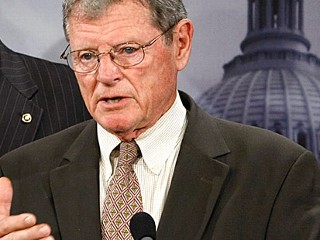The big news so far from the current hearing before the House Energy and Commerce Committee’s Subcommittee on Energy and Power—concerning the so-called “Energy Tax Prevention Act of 2011”—is that Senator James Inhofe, the leading climate change denier in the U.S. Congress, has a book coming out.
Inhofe had crossed chambers to testify in favor of the new legislation, which he co-authored with Energy and Commerce chair Fred Upton and subcommittee chair Ed Whitfield, and which would block the Environmental Protection Agency from regulating greenhouse gas emissions under the Clean Air Act. And in response to a question from Upton, Inhofe took the opportunity to mention his book, telling the committee that he just finished it and that it will be entitled “The Hoax.”
The title, presumably, refers to Inhofe’s most (in)famous statement: His 2003 claim that climate change is the “greatest hoax ever perpetrated on the American people.” I suppose it’s kind of like Carl Sagan entitling one of his last books Billions and Billions. Sagan didn’t like being remembered by that phrase, which he’d never actually uttered–but it’s much better than the one Inhofe is going to be remembered by, and did use to dismiss climate change.
But book or not, what’s most striking about the hearing underway right now is the central role Inhofe was given–not just to lead it off, but to pronounce definitively on the technical issues at stake, both economic and scientific.
The purpose of the legislation in question is to block the EPA from moving to regulate greenhouse gases, which it is on the path to doing based on the agency’s scientific determination that they endanger public health and welfare. In order to question EPA’s expert science, then, you’d think you would at least need dissenting scientists. And there are plenty of those around, including those “skeptics” who just signed a letter to Congress making their standard arguments.
But in a departure from standard Republican strategy, the hearing today doesn’t even have skeptical scientists on the docket. Instead, it offered Inhofe as a kind de facto expert on environmental science, policy, and economics.
As Rep. Bobby Rush of Illinois put it, in a question to Inhofe himself: “Don’t you find it strange that this hearing is being conducted with no scientists at all?”
Don’t get me wrong—Inhofe is well versed in these issues and speaks confidently and expansively about them. But his views on the science and the economics alike are not only non-expert; they’ve been documented extensively, by myself and many others, to misrepresent what experts actually think.
That continued today, as Inhofe asserted that the findings of the U.N. Intergovernmental Panel on Climate Change had been “totally debunked” by the ‘Climategate’ scandal, and called mainstream climate science “phony.” Later, he also said he disagreed with the National Academy of Sciences’ “interpretation” that global warming is caused by human activities.
Nevertheless, my sense from watching the first hour of the hearing is that Inhofe’s fellow Republicans have come to view him as the grand don of climate change skepticism in the Senate. They not only trust him, they defer to him. What Inhofe says is good enough for them–and on that basis, they’ll make decisions affecting the entire planet.
Subscribe to our newsletter
Stay up to date with DeSmog news and alerts







